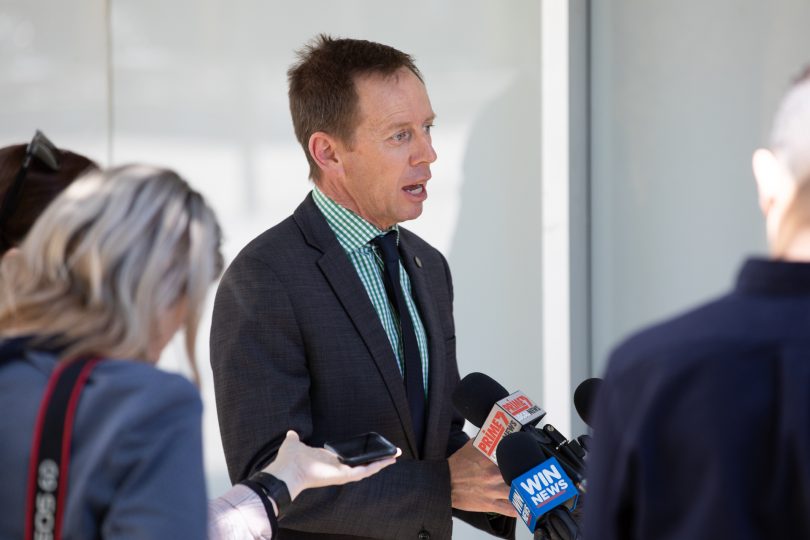
As the latest Anglicare snapshot has shown, Canberra’s rental crisis is worsening with residential vacancy rates at 0.4 per cent. Photo: Michelle Kroll.
The picture for Canberra’s renters is not looking pretty, with the latest rental affordability snapshot showing things are getting worse, especially for those relying on Federal Government support.
At the same time, the ACT Government is proposing a swathe of reforms to strengthen residential tenancy laws, including minimum standards for rental properties.
But some fear this will not help alleviate the current ‘perfect storm’ wreaking havoc for both investors and renters.
According to the latest Anglicare report, there are only five affordable and appropriate properties on the market for a couple with two children where both adults are receiving the JobSeeker payment and one child is aged under five and one under 10.
It’s the same grim picture for a single parent receiving the parenting payment. Again, there are only five available properties.
For singles receiving JobSeeeker, Youth Allowance, or the Disability Support Pension, there are currently no properties available at all.
Affordable rent is generally deemed to be no more than 30 per cent of a person’s income.
ACT Shelter CEO Travis Gilbert said the Territory’s private rental market is a tough place to be for anyone receiving income support payments.
The residential vacancy rate in the ACT is currently extremely tight – at only 0.5 per cent. Mr Gilbert noted a vacancy rate of 3 per cent showed “a rental market balanced between landlords and tenants”.
The ACT Government is considering a range of reforms that would, among other things, prevent landlords from ending leases without cause, seek to regulate and prohibit rent bidding, and set minimum standards for rental properties.
Feedback into these rental reforms was released yesterday and there were “mixed views” on a variety of topics.

Attorney-General Shane Rattenbury said any reform to rental laws would seek to balance the rights and responsibilities of tenants and landlords. Photo: Michelle Kroll.
Attorney-General Shane Rattenbury said everyone in Canberra deserved a “safe and secure place to live” and all reforms would seek to balance the rights and responsibilities of tenants and landlords.
“Tenants should have the right to turn rental properties from a house into a real home. Property owners should also have the ability to effectively and fairly manage their properties,” he said.
Real Estate Institute ACT President and Director of Property Management for The Property Collective Hannah Gill agreed with these sentiments.
But that doesn’t mean Ms Gill, and much of the industry, isn’t concerned about these reforms being implemented in a way that doesn’t have “unintended consequences”.
“We completely support the principles of the reform,” she said.
“You want people to have a home that is warm and safe and secure, but when you look at some of the framework for delivering that for older homes, that becomes problematic in terms of the costs involved.
“Those landlords aren’t going to spend significant amounts of money … they are going to opt-out and sell because the market’s hot.”
From there, Ms Gill said, those properties are more likely to be sold to owner-occupiers or developers, rather than go back to the rental market.
“It’s a challenge and we are seeing less stock on the market … which will push rents up.”
Ms Gill said, above all, increasing the supply of rentals to the market must happen.
The government’s feedback report also found minimum standards should be clearly defined and specific so compliance could be determined easily.

Hannah Gill is the Real Estate Institute ACT President and Director of Property Management for The Property Collective. Photo: File.
Ms Gill said it’s hoped there will be some assistance for investors bringing their properties up to new standards but warned there would be some properties – particularly those which attract students and young professionals for group housing – which wouldn’t be able to meet them.
Furthermore, although the ACT Government has already committed to banning no-cause evictions, Ms Gill said it’s important this is replaced with something else useful.
“It’s already the longest notice in the country. A tenant is given six months’ notice … you could argue that is much fairer than the eight-week notice given because an owner wants to move in,” she said.
The government’s report on the consultation process showed the majority of respondents who argued against the removal of no-cause evictions were either landlords or real estate agents.
Views on paying more than the advertised price for a rental property were more mixed.
“Several landlords and agents were strongly opposed to preventing tenants from offering more than the advertised price for a property, arguing that rent bidding is a legitimate means to achieving the market price for the property,” the report said.
But tenant advocates strongly urged all forms of rent bidding be banned, arguing it is unfair.
Original Article published by Lottie Twyford on Riotact.




